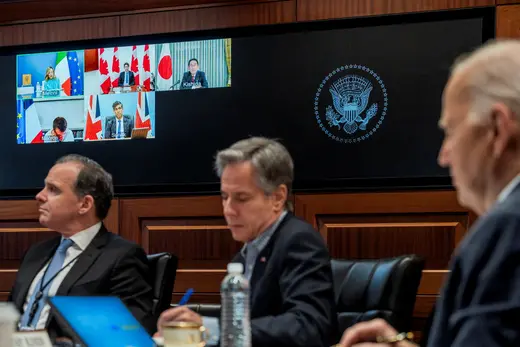In Brief
Iran Attack Means an Even Tougher Balancing Act for the U.S. in the Middle East
The unprecedented Iranian attack on Israel presents U.S. officials with mounting challenges in trying to contain the conflict and maintain a deterrence against Iran and its allies.
What is Washington’s main challenge in the aftermath of Iran’s attack on Israel?
The Joe Biden administration has to balance both its desire to prevent the intensification of what is already a regional conflict and Washington’s long held interest in helping to ensure Israeli security. Despite the successful defense of their territory (with U.S. and other partners), the Israelis have indicated that they cannot allow Iran’s attack go unanswered given the unprecedented nature of the barrage on Israeli territory. Reports suggest that President Biden has made it clear to Prime Minister Benjamin Netanyahu that he does not support an Israeli response. To Israeli decision makers, this is clearly not a green light to respond, but it also may not be a red light. Given the likely political pressure with the Israeli government and public to respond to Iran, Netanyahu may very well choose to interpret the President’s words as a yellow light. This means the Israelis would be on their own, but that may suit them under the circumstances.
Should we expect a beefed up U.S. military and diplomatic effort to counter Iran and its axis of resistance (and what should we make of Jordan’s response and other regional reactions to the attack)?
Yes, the U.S. military presence in the region will remain significant. The White House has already announced a diplomatic initiative among its Group of Seven partners to sanction Iran.
More on:
Much has been made of the Jordanian air force’s successful efforts to shoot down Iranian drones. This is a testament to the durability of the 1994 peace treaty despite very difficult relations between Jordan and Israel in the last six months, the Jordanian leadership’s desire to avoid an escalation of the regional conflict that began on October 7, and, importantly, how much Jordan’s King Abdullah values his strategic ties with the United States.
Will the weekend actions spur the U.S. Congress to approve new Israel aid mired in impasse over Ukraine aid?
It seems likely that Israel’s friends in Congress will now make a renewed push to pass a security assistance package. Whereas Israel’s military operations in the Gaza Strip have become controversial and sensitive for the White House, a conflict between Israel and Iran in which the Iranian regime is launching large numbers of drones, cruise missiles, and ballistic missiles at Israel is an entirely different matter, which means security assistance is now more likely to be forthcoming.
Could the latest escalation have any effect on efforts to reach a ceasefire deal in Gaza between Israel and Hamas?
It is not clear that they are connected. Hamas remains an obstacle to a ceasefire because the hostages are the group’s only bargaining chip. The Iranian attack and the effectiveness of Israeli (and allied) defenses does not change the Hamas leadership’s calculations.
More on:
 Online Store
Online Store
